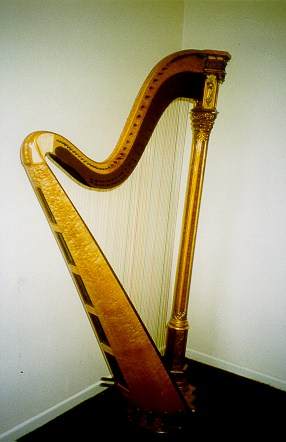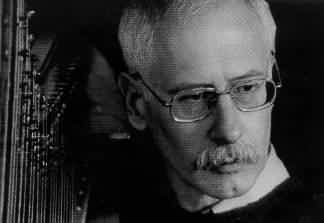| I must have the harp in my blood for I am a third generation harpist
though I learnt to play it long after my Mother had died.
The first of our harpist family was my grandmother, Annie Rexford. She bought her Erard Harp, which I still have, in the early 19th century. She must have had difficulty in keeping up the playing of it with her extensive family of twelve. The only one of her extensive family who took it up was my mother and this was how I came to find a harp in my home where I was born.
One day I was called upon by a young man called Brian Davis who had just left school and was on his way to Cambridge. He had been told by his music master, Frank Lynas, who had helped me with my opera Avon, to call on me, as I lived in the same place. Brian was a viola player, but I must have shown him our family harp, behind its golden robe, all unstrung though it was. We became close friends in spite of the difference of age and Brian helped me considerably with the formation of the Sacred Music Drama Society, managing to interest a number of his Cambridge friends in joining.
He took it and had it properly strung. He was told by the man who did this that it was the most beautiful harp he had ever seen. He was also told that it had been bought second-hand by my grandmother from a lady whose name he gave us. Brian had his first lessons from Helena Morcom Taylor, a lady who was a fellow University tutor of mine, who played the Celtic harp in our small group that accompanied the mediaeval music-dramas. When Brian became more ambitious as a harp player he had lessons from the famous harpist Maria Korchinska and he was wanting to own his own harp, so he brought our family harp back to its own home. It looked so beautiful all strung-up again that I could not resist the temptation to have a go at it myself. Helena Morcom Taylor came to give my daughters some lessons on the violin which she also played, so I asked her also to give me a little instruction on the harp. I’m afraid it did not last long but it was enough to make me realise what a difficult instrument the harp was. So gradually the family harp came to resume once more its stagnation behind its golden robe with all the strings broken except the bass stalwarts and I fear that never may it be played again. The only comfort is that harps, unlike violins do not improve in value with age as sooner or later the sound-board becomes warped. However my long familiarity with the harp, together with my final attempt to play it, has stood me in good stead in writing for it. When I happened to play over the recording of the first performance at St. Peter’s Crawley in my Hail, Sacred Day a celebration of Cornish Carols - it was some twenty years later - I could not help feeling what a good work for the harp it was. That work has since been published and it and the harp part was so effective that it was difficult to imagine it being played on any other instrument like the piano, which was obviously going to be the case when a harp was not available. I wrote a number of other works for the voice with harp accompaniment. The soprano Margaret Lindsay suggested a triptych called "Woman’s Heart" with the first song scorning the man and with a second song in which the man scorns the woman, and a last song in which they come together. I had not known that Queen Elizabeth I was a poet, but Margaret Lindsay produced some words that reduced the poor man to mincemeat. The second song was Shakespeare’s "Willow Song" from Othello. I had known this too much in Boito’s version which is a travesty of Shakespeare. The original has some very powerful words (entirely cut by Boito) but which shows how beastly a man can be to a woman. The harp is very effective as an accompanying instrument here, for it suggests the play of some quiet water as a background to the poor woman’s shame. The poem for the last song was Sir Philip Sidney’s "My true love hath my heart, and I have his." which was not difficult to set ending with some harmonics on the harp. Most of the other things I have written for the harp or for voice and harp were performed at my 90th Birthday Concert and are described there. There has been an astonishing reprieve for our family harp. After having been pushed away in its golden robe into the corner of one of our spare rooms, it has been brought out once again. Brian teaches the harp at the Gresham School, Holt, where they have no harp of their own for students to use, who have been dependent on Brian’s harp for any practice they have been able to do. So Brian has persuaded the school to borrow our family harp for a period of ten years on the condition that they stand the expense of repairing it and keeping it in condition during the period of loan. This they have agreed to do. So once more Brian has been able to bring our beautiful harp back to show it off to us in all its glory, as when we brought it home before. But this time it had a new sound-board as well as being all strung up for performance as when I first tried it. Brian spent a long time tuning it, and then sat down to pay some Handel. I think he enjoyed playing it, for it must have reminded him of the days when he first borrowed it and had it repaired to make it playable for concert use. So our little grand-daughters, now aged 4, 3½ and 2 respectively will have to wait the long period of ten years before one of them comes to claim the family harp from Gresham School. I will be 101 at that time, if I am still alive. Which of the three is most likely to make the claim? Of course it is quite possible that there will be no interest at all. I have asked the two mothers to try out Catherine, Emma and Chloe with the Clarsach which can be made up from a kit and which will at least show whether there is any aptitude for the harp. It would be very disappointing if there was no keenness whatsoever. But I cannot help hoping that at least one of my grand-daughters will have inherited some of my mother’s and grandmother’s aptitude for the beautiful family harp. |

